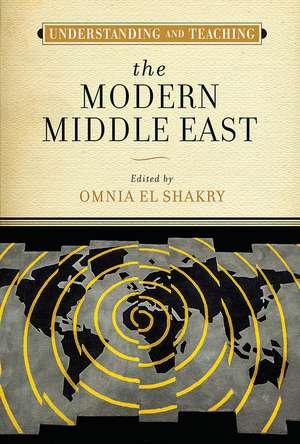Understanding and Teaching the Modern Middle East: The Harvey Goldberg Series for Understanding and Teaching History
Editat de Omnia El Shakryen Limba Engleză Hardback – 19 oct 2020
Preț: 263.74 lei
Nou
Puncte Express: 396
Preț estimativ în valută:
50.47€ • 52.82$ • 42.00£
50.47€ • 52.82$ • 42.00£
Carte tipărită la comandă
Livrare economică 31 martie-14 aprilie
Preluare comenzi: 021 569.72.76
Specificații
ISBN-13: 9780299327606
ISBN-10: 0299327604
Pagini: 384
Ilustrații: 10 b-w illus.
Dimensiuni: 152 x 229 x 25 mm
Greutate: 0.66 kg
Ediția:1st Edition
Editura: University of Wisconsin Press
Colecția University of Wisconsin Press
Seria The Harvey Goldberg Series for Understanding and Teaching History
ISBN-10: 0299327604
Pagini: 384
Ilustrații: 10 b-w illus.
Dimensiuni: 152 x 229 x 25 mm
Greutate: 0.66 kg
Ediția:1st Edition
Editura: University of Wisconsin Press
Colecția University of Wisconsin Press
Seria The Harvey Goldberg Series for Understanding and Teaching History
Recenzii
“This book is unique in its breadth and scope. There is no comparable volume that offers guidance on teaching the Middle East at the university or high school level. Chapters include a diverse range of voices, and the gender balance among the contributors is commendable and significant, placing it at the cutting edge of academic pedagogy.”—Rachel Harris, editor of Teaching the Arab-Israeli Conflict
“With the emphasis on the diversity of elements involved in the topics covered and a conscious avoidance of ‘essentialist’ approaches, the authors individually and the volume as a whole succeed in presenting analyses that are not Orientalist or civilizationalist, while avoiding ideological polemics.”—John Voll, Georgetown University
“This effective, rigorous, and critical volume is an excellent contribution to help rethink and reframe teaching and understanding the modern Middle East. . . . A welcome and ambitious intervention that doesn’t shy away from addressing difficult topics. It anticipates many of the problems and questions that often emerge in classrooms and proposes novel ideas on how to address them. . . . This superb volume is highly recommended.”—The History Teacher
“With the emphasis on the diversity of elements involved in the topics covered and a conscious avoidance of ‘essentialist’ approaches, the authors individually and the volume as a whole succeed in presenting analyses that are not Orientalist or civilizationalist, while avoiding ideological polemics.”—John Voll, Georgetown University
“This effective, rigorous, and critical volume is an excellent contribution to help rethink and reframe teaching and understanding the modern Middle East. . . . A welcome and ambitious intervention that doesn’t shy away from addressing difficult topics. It anticipates many of the problems and questions that often emerge in classrooms and proposes novel ideas on how to address them. . . . This superb volume is highly recommended.”—The History Teacher
Notă biografică
Omnia El Shakry is a professor in the Department of History at the University of California, Davis. She is the author of The Arabic Freud: Psychoanalysis and Islam in Modern Egypt and The Great Social Laboratory: Subjects of Knowledge in Colonial and Postcolonial Egypt and the editor of Gender and Sexuality in Islam.
Cuprins
Contents
Preface XI
Acknowledgements XVII
Note on Transliteration XXI
Part One: The Middle East in the Classroom
Why Can’t You Find the Middle East on a Map? 15
Part Two: Understanding and Teaching Historical Content
Part Three: Understanding and Teaching the Contemporary Middle East
Part Four: Methods and Sources
Preface XI
Acknowledgements XVII
Note on Transliteration XXI
Part One: The Middle East in the Classroom
Why Can’t You Find the Middle East on a Map? 15
Michael Gasper
Controversy in the Classroom: Lessons from the Modern Middle East 35
Omnia El Shakry
Part Two: Understanding and Teaching Historical Content
The Legacy of Islam in the Modern Middle East 49
Ovamir Anjum
Colonialism, Empire, and Nationalist Movements 68
Sara Pursley
Decolonization and the Reconfiguration of the Global Order 85
Muriam Haleh Davis
The History of Israel/Palestine 101
Sherene Seikaly
Understanding Sectarianism as a Global Problem 117
Ussama Makdisi
The Iranian Revolution: From Monarchy to the Islamic Republic 132
Naghmeh Sohrabi and Arielle Gordon
Part Three: Understanding and Teaching the Contemporary Middle East
US Foreign Policy in the Middle East 151
Nathan J. Citino
America, Oil, and War in the Middle East 168
Toby Craig Jones
Teaching the Global War on Terror 184
Darryl Li
Arab Uprisings in the Modern Middle East 201
Asef Bayat
Refugees in and from the Middle East: Teaching about Displacement in the Context of the International Refugee Regime 217
Rochelle Davis
Part Four: Methods and Sources
Literature as a Source for Teaching Modern Middle East History 243
Elliott Colla
Cinema as a Source for Teaching Modern Middle East History 254
Kamran Rastegar
Gender and Sexuality: Sources and Methods 271
Hanan Hammad
Nuancing the Narrative: Teaching the Jewish Modern Middle East 283
Alma Rachel Heckman
The Armenian Genocide and the Politics of Knowledge 295
Christine Philliou
Using Primary Source Documents to Teach Nationalization and Imperialism in the Modern Middle East 309
Kit Adam Wainer
Keeping Current: Contemporary Engagement When Teaching Modern Middle East History 326
Ziad Abu-Rish
Contributors 343
Index 349
Index 349
Descriere
Moves away from common orientalist foundations that have dominated the West's understanding of the modern Middle East. By presenting multiple viewpoints, this book is a springboard for instructors hoping to encourage students to negotiate the contingencies and contradictions in the region's history.










